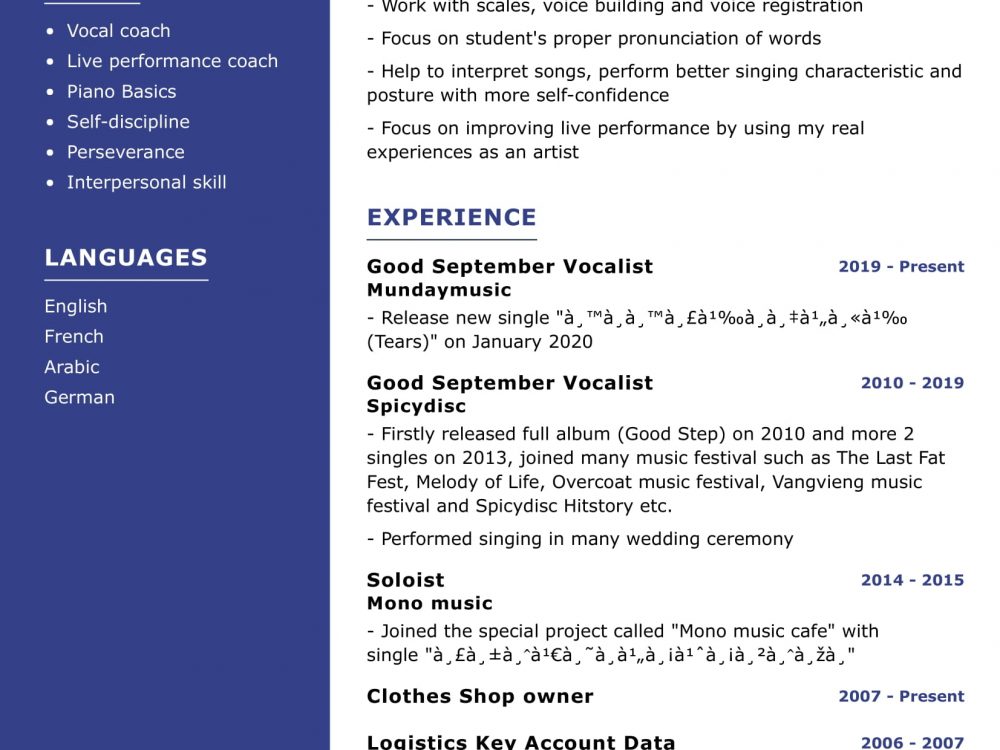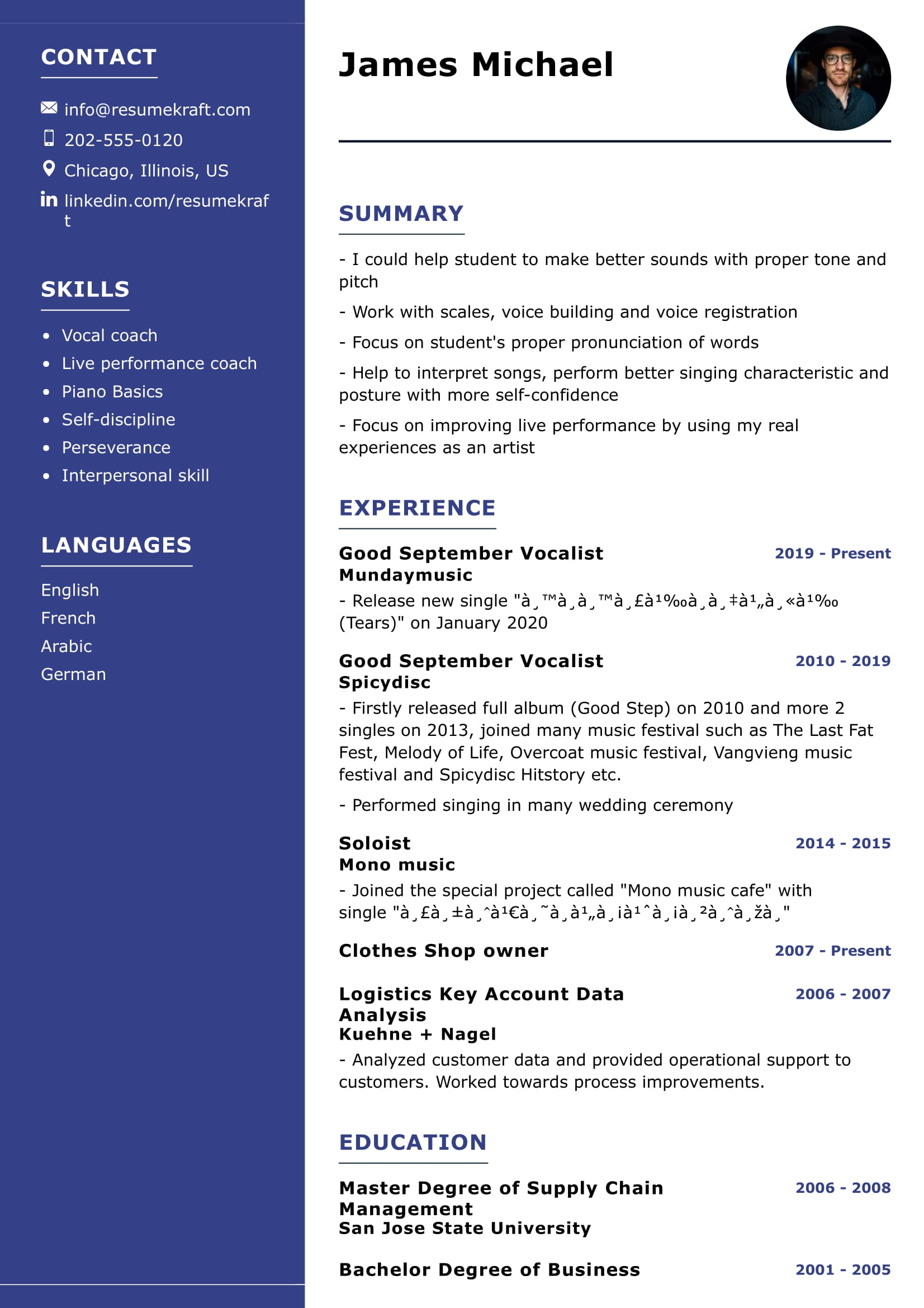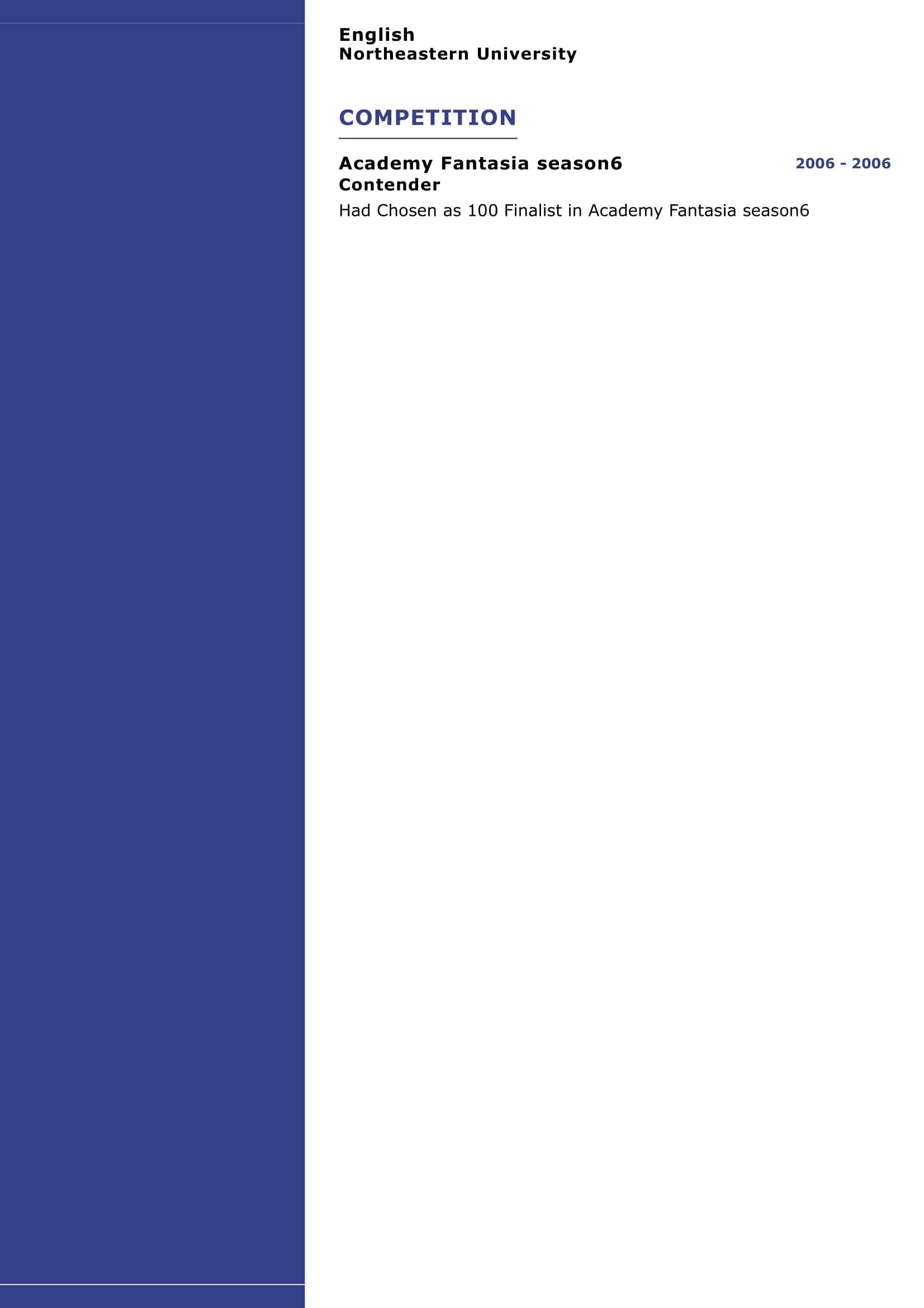What Should Be Included In A Vocalist Resume?
A good vocalist resume should include information about your vocal abilities, experience, and education. It should also include any awards, recognitions, and certifications you may have earned.
When writing a vocalist resume, it is important to highlight your vocal range, experience singing in different styles, and any related accomplishments. Be sure to include any musical instruments you play, experience leading choirs or other groups, and any specialized vocal training you have had.
It is also important to showcase your stage presence, showmanship, and crowd interactions. If you have been part of any recordings or productions, make sure to include that as well. Listing any volunteer work or promotions you have done or any other extra-curricular activities related to vocal performance will also demonstrate your commitment to the art.
Finally, include any professional affiliations and/or awards that you have earned. This will demonstrate your dedication to your craft and will make you stand out from the competition.
By including all of this information in your vocalist resume, you will be sure to capture the attention of potential employers and show them that you are a serious and dedicated vocalist.
What Skills Should I Put On My Resume For Vocalist?
When applying for a vocalist position, it’s important to have a well-crafted resume that highlights your skills and abilities. Along with showcasing your experience and accomplishments, your resume should also demonstrate your talent as a vocalist. While every vocalist job will require different skills, there are some key skills that every vocalist should consider including on their resume.
The ability to sight-read music is an important skill that is often required for vocalists. Sight-reading is the ability to read and interpret music notation quickly and accurately, without any prior knowledge of the piece. If you have experience in sight-reading, be sure to mention this on your resume.
Having a good ear is also important for vocalists. This means that you should be able to accurately identify notes and harmonies, as well as discern different types of sounds. Being able to identify pitch and rhythm accurately will also be beneficial for vocalists. If you have experience in ear training, be sure to include this on your resume.
Vocalists should also be able to demonstrate strong performance skills. This includes being able to perform confidently, engage the audience, and give an emotionally-driven performance. If you have experience in performing, be sure to include this on your resume.
Including information about your vocal range is also important for vocalists. Be sure to mention the type of music you are comfortable singing, as well as the range of notes you are comfortable singing. This will give potential employers an idea of the type of repertoire you can handle. By including these important skills on your vocalist resume, you can demonstrate to potential employers that you have the necessary skills to be successful in the role.
What Is The Job Description Of The Vocalist?
.The job description of a vocalist can vary significantly depending on the type of music they perform. For example, a singer in a jazz band might have a very different job description than a vocalist who performs in a rock band. Generally speaking, vocalists are responsible for singing the lyrics to a piece of music and they may also provide backing vocals if the song requires it. They must also be able to read the music and be familiar with the musical instruments they are playing with. Additionally, they must be able to interpret the musical score and adjust their singing accordingly. As a vocalist, you must also have excellent stage presence and know how to work with an audience. Additionally, you must be able to collaborate effectively with your fellow band members and work with the sound crew to ensure the best possible sound quality.
As a vocalist, you must have an excellent ear for music and be able to pick up on subtle nuances in the music. You must be able to pick out the different instruments being played and have a good understanding of the music theory behind the songs. Additionally, you must have a good sense of rhythm and be able to stay in time with the other musicians. You must also be able to interpret the musical score and adjust your singing according to the dynamics and tempo of the music. Finally, you
What Is A Good Objective For A Vocalist Resume?
When crafting a resume to showcase your vocal talent, it is important to have a good objective that captures the attention of potential employers. A good objective statement should be tailored to the job you are applying for, as it will give employers an understanding of your goals and how you plan to achieve them.
When writing an objective statement, you should use clear, concise language to demonstrate your proficiency and experience in the vocal domain. Additionally, you should emphasize the skills that you possess which make you a valuable vocalist. This could include a wide vocal range, musical knowledge, and the ability to work well with others.
Furthermore, you should also include any relevant experience you have in the industry and express your commitment to the job. This will demonstrate your dedication and enthusiasm for the field, as well as show employers that you are a reliable and motivated individual.
Overall, a good objective for a vocalist’s resume should be concise and accurately reflect your ambitions and qualifications. By showcasing your strengths in the vocal domain, you can help employers understand your capabilities and make a positive impression on them.
What Are 5 Responsibilities Of A Vocalist?
As a vocalist, it is essential to understand the various responsibilities that come with the job. Vocalists must be able to provide a powerful and emotional performance to their audience, while also having the technical and artistic skills to sing a wide variety of styles. Here are five key responsibilities of a vocalist that all aspiring singers should be aware of.
- Convey it’s message to audience: This requires a vocalist to have an understanding of the music and its lyrics, as well as the ability to express emotion through their singing. Additionally, a vocalist should also be familiar with various techniques, such as vibrato and breath control, to make their performance more captivating.
- Confidently in front of Audience: This involves not only being able to sing, but projecting a stage presence and engaging the audience. A vocalist should also have the confidence to make quick decisions while performing, such as deciding which musical passages to emphasize or improvise.
- Work with variety of Musicians: This requires a vocalist to be able to listen to the other musicians and create a cohesive performance. A vocalist should also have the ability to adapt to changes in tempo and key quickly.
- Rehearse Effectively: This means not only learning the material but also perfecting the nuances of the music. A vocalist should also be able to critique their own performance and make improvements before performing live.
- Technical & Artistic skills to Sing various styles: This includes the ability to express emotion and interpret lyrics in different ways. They should also be able to use proper vocal technique, such as breath control, pitch accuracy, and vocal range. They sh be aware of and understand basic music theory, including chord progressions, key signatures, and time signatures. They sh also have the ability to adapt to changes in tempo and key quickly and be able to use vocal effects if needed.
What Are The Career Prospects In The Vocalist?
The career prospects for vocalists in today’s music industry are quite varied, with opportunities to pursue a career as a live performer, studio musician, composer, songwriter, and more. For those who are just getting started, the best way to kick off a career as a vocalist is to land a gig performing live. Live performances offer an amazing opportunity to hone your skills and develop your stage presence as you prepare to take your career to the next level.
When you are ready to move on to the studio setting, you will need to be able to demonstrate both your vocal performance skills and your vocal production skills. In this setting, you will be expected to record your parts, arrange them, and mix them together to create a finished product. This requires a high level of technical knowledge and experience in both the vocal and production aspects of the music industry.
For those who are looking to pursue a career as a songwriter or composer, there are many opportunities to be found in the music industry. Songwriters and composers can make a name for themselves by writing songs for artists and bands, and by pitching their own material to record labels. This requires a strong understanding of the music industry, as well as a knack for creativity and composition.
No matter which career path you choose as a vocalist, the key to success is dedication and hard work. There is no one-size-fits-all approach to becoming a successful vocalist, but with practice, determination, and the right connections, you can make it big in the music industry.



